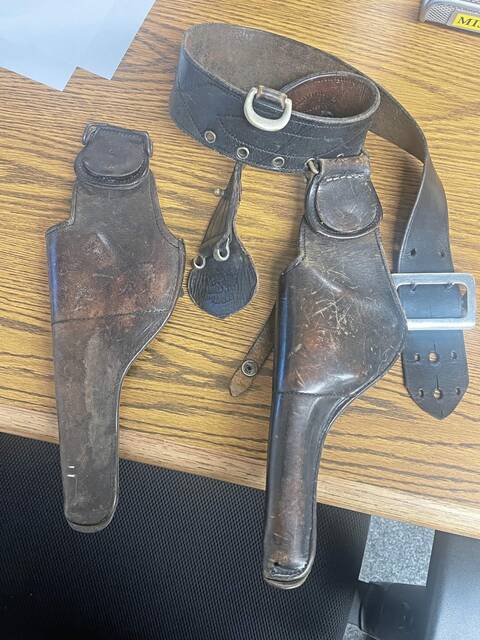Former police chief’s badge, other possessions return to Bethel Park
For what probably amounted to decades, a woman on the West Coast had been in possession of family heirlooms that came from Bethel Park.
More accurately, the aged gun holsters, identification card and silver badge originated in what then was Bethel Township, by way of her stepfamily.
Whatever the case, she decided it was time for the items to go.
“Recently, she walks into a station of the California Highway Patrol and she turns them over to a police officer there, one of the highway patrol officers, who then calls Bethel Park police,” the department’s chief, Timothy O’Connor, said.
The patrolman related the story to Bethel Park Sgt. Rob Stiglich, who told him:
“Yeah, we’ll take them.”
Now, the onetime belongings of the late George W. Kercher, briefly a Bethel Township police chief in the early 1950s, are in the possession of the Bethel Park Historical Society as part of its continually growing collection of memorabilia on display at the Schoolhouse Arts and History Center on South Park Road.
Saying they should be seen by the public, O’Connor presented the items to society members at their June meeting, during which he explained a further component of Kercher’s significance to local history.
On March 4, 1948, Patrolman Joseph Chmelynski, a 25-year-old World War II veteran who had been on the Bethel Township force for two years, accompanied Kercher in response to a burglary reported at a Broughton Road house. The policemen apprehended Edward DiPofi Jr. and John R. Wilson, who had broken in while the homeowners were on vacation.
“They handcuffed them together,” O’Connor said, “and as they’re walking them out, Mr. DiPofi pulls a pistol out, and he shoots and kills Officer Chmelynski and he wounds Officer Kercher.”
To date, official records list only one other Bethel Township/Park police officer as killed in the line of duty: Detective Lynn Sutter, who was shot accidentally during a Mt. Lebanon drug raid in 1987.
Kercher died in 1954 at age 47.
“They have an autopsy done. They could not say conclusively that his death is tied to the wound from the shooting,” O’Connor said. “Probably now, with better technology, they would be able to say one way or another.”
His department, with Officer Sean Gorman taking the lead, is looking whether records with the Allegheny County medical examiner’s office are available to help establish Kercher’s credentials for inclusion in the National Law Enforcement Officers Memorial in Washington, D.C. The memorial honors more than 23,000 officers who have died in the line of duty throughout American history.
In the aftermath of the 1948 shooting, DiPofi was convicted of first-degree murder and sentenced to death. He lost his appeals to the state and U.S. supreme courts, and died in the electric chair on Jan. 9, 1950.
Sociologist Bill Lofquist’s meticulously researched “State Killings in the Steel City: The History of the Death Penalty in Pittsburgh” presents the case as representing something of a milestone.
“DiPofi was the last white person from Allegheny County to be executed and only the second white person, along with Martin Sullivan, to be executed since 1930,” Lofquist wrote. “Eleven Black men were executed during that period.”
Wilson, DiPofi’s brother-in-law accomplice, pleaded guilty to murder and was sentenced to life imprisonment. He died May 23, 1958, according to Lofquist.
As for Kercher, his promotion to police chief was short-lived, as he was removed by the vote of a newly elected municipal board in 1951. Prior to his death, he worked as an Allegheny County detective.
In O’Connor’s opinion, the circumstances at Broughton Road may have turned out differently had the officers been prepared adequately to handle the likes of Wilson and DiPofi.
“Today, these people would have been searched. They would have been handcuffed individually with their hands behind their back,” he said. “We’ve developed techniques and training procedures to avoid these kinds of incidents. So we’re fortunate today. We’ve learned from things that happened in the past, and hopefully we can prevent further tragedy.”
For more information, visit state-killings-in-the-steel-city.org/2018/03/04/edward-dipofi.
Harry Funk is a TribLive news editor, specifically serving as editor of the Hampton, North Allegheny, North Hills, Pine Creek and Bethel Park journals. A professional journalist since 1985, he joined TribLive in 2022. You can contact Harry at hfunk@triblive.com.
Remove the ads from your TribLIVE reading experience but still support the journalists who create the content with TribLIVE Ad-Free.




